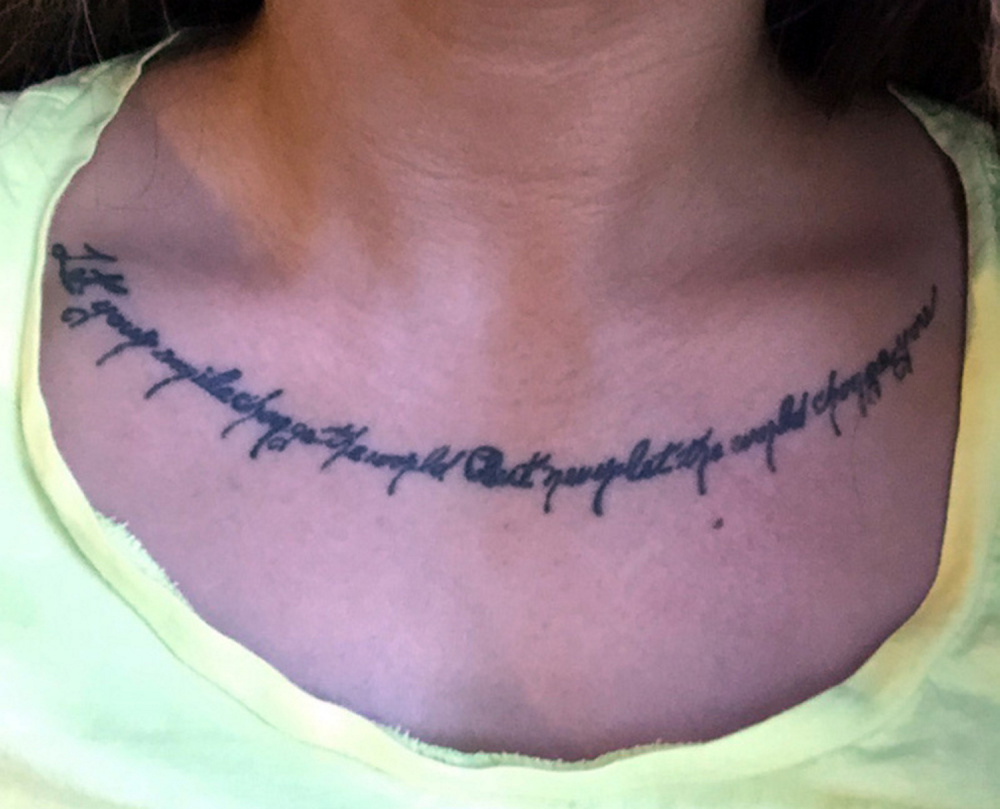Recruiting and keeping good people is a challenge for most employers. It’s even worse if the work entails being separated from loved ones and the possibility of being wounded or killed.
So it’s puzzling that a tattoo that wouldn’t disqualify a male recruit could keep a young Kennebunk woman from becoming a Marine. The Marine Corps has the right to set its own rules, but it should be aware that it could forfeit otherwise-qualified recruits because of uniform regulations that aren’t, well, uniform.
At issue is the tattoo that Kate Pimental, now 20, got two years ago; it reads “Let your smile change the world but never let the world change you” and is just below her collarbone. A male Marine with a tattoo in a similar place on his body would be eligible for a waiver, because the tattoo would be covered by the crewneck undershirt worn by men in the Marines.
But the allowable T-shirt for a woman in the Marines has a V-neck that would leave Pimental’s tattoo partly exposed, making her chances of getting a waiver less certain. Pimental told The Huffington Post on Monday that she and her recruiter have been waiting about seven months and still haven’t heard whether she qualifies for the Marines.
Like the Marines, the Army, Navy and Air Force also bar neck tattoos if they can’t be covered by clothing. Unlike the Marines, though, the other three branches allow women as well as men to wear crewneck T-shirts. These women, then, aren’t faced with a choice that is actually no choice at all: violate dress standards or violate tattoo policies.
The tattoo policy has apparently been the big stumbling block for Pimental, who has said that recruiters have declared her to be physically and mentally fit for the Marines. This is significant in an era when an estimated 71 percent of Americans ages 17 to 24 wouldn’t qualify to enlist if they tried, because of felony convictions, obesity or lack of a high school diploma.
In fact, just 1 percent of young people in this age group are both eligible for and interested in military service, says Allen Batschelet, the general in charge of Army Recruiting Command.
Thirty-eight percent of 18- to 29-year-olds (the prime demographic for military service) have at least one tattoo, and military policy is changing to reflect this cultural shift. If Kate Pimental wants to serve her country, and she meets the Marines’ physical and mental fitness standards, it would be unfortunate for an inconsistent rule on tattoos to keep her out.
Send questions/comments to the editors.



Success. Please wait for the page to reload. If the page does not reload within 5 seconds, please refresh the page.
Enter your email and password to access comments.
Hi, to comment on stories you must . This profile is in addition to your subscription and website login.
Already have a commenting profile? .
Invalid username/password.
Please check your email to confirm and complete your registration.
Only subscribers are eligible to post comments. Please subscribe or login first for digital access. Here’s why.
Use the form below to reset your password. When you've submitted your account email, we will send an email with a reset code.